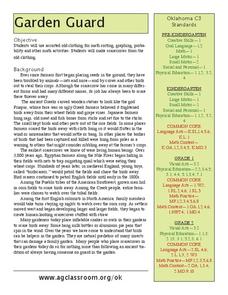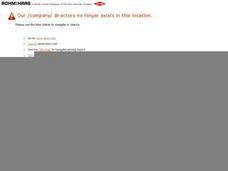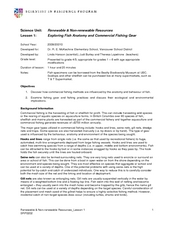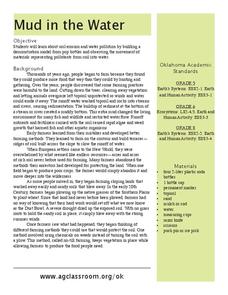Curated OER
The Impact of Fishing
Young scholars explore the concept of fishing as it relates to oceans and how some fishing practices can damage the health of the marine ecosystems. In this activity on the impact of fishing, students research the many places in the...
Curated OER
Aquaculture
Introduce viewers to the growing field of aquaculture with this set of 13 slides. They are simple and straightforward in content, listing facts in bullet-point fashion. No photos or graphics are included, but the information is valuable....
Curated OER
Marine Fisheries Management
Almost 200 slides make this a vast collection! It is a quirky collection, titled "Marine Fisheries Management," but having little to do with that occupation. What you will find are two-toned blue backgrounds with no pictures, but a few...
Curated OER
Aquaculture: Down on the Salmon Farm
Students examine the changing practices of aquaculture. They discuss the short term and long term consequences stemming from fish farming.
Curated OER
Alternative Animal Agriculture
Eighty slides dealing with the 6 types of farming alternative animals. Specialty producers and the methods that they employ are detailed and some slides deal with the history and origins of farming and the reasons for commerical use.
Curated OER
Fish In a Bottle
Students work together to build their own fish ecosystems. As a class, they share their prior knowledge about catfish and use a diagram to label its body parts. They record their observations of the ecosystem and determine what they...
Curated OER
Crawfish Farming
Learners study crawfish and how to farm them. In this crawfish lesson students examine how to establish a growing facility and how to reproduce crawfish.
Curated OER
Obtaining Food -- The Impact of Over-fishing
Students play a fishing game. In this food supply lesson students regulate their fishing in a game about over-fishing. The students identify resources that could be extracted from that biome.
Curated OER
Aquaculture
Learners examine an experiment in which 2 types of commercial fish are fed a new type of fish feed and a commercial fish feed which costs ten times as much. They calculate in the fish grow as well with the cheaper fish feed and then...
Curated OER
Garden Guard
Students read about the history of farming with the use of scarecrows and then sort clothing, build scarecrows, write descriptions, and more. In this scarecrows lesson plan, students also play a game called Garden Tag.
Curated OER
Aquaculture: Down on the Salmon Farm
Students examine the problems of the continued development of aquaculture. They also brainstorm ideas that people in this field would need to be successful.
Curated OER
Investigation 11 - Utah Fish
Fourth graders examine a particular Utah fish and then create a poster that shares what they learned. They access websites imbedded in this plan to aide them in their research.
Curated OER
Happy the Fish
Students explore the ways in which people's actions affect fish. They discuss pollutants that are in the water. Students define the terms chemicals, cooling pond, and pollutant. They create a book about Happy the Fish.
National Geographic
Spot Where You DON'T Get Your Seafood
When your class is examining the fishing industry or sustainable practices, you can use this brief activity to demonstrate the global impact our food choices have. Overharvesting, overfishing, and bycatch are important topics to address...
Curated OER
Shoal Destroying
Students investigate methods used in the fishing industry. In this environmental stewardship lesson, students visit selected websites to research fishing methods and create a game based around the fishing industry.
Curated OER
Not Just a Fish Tank
Students learn about a specific species of fish, study the effects of outside substances on the reproductive development of a fish, and explore the process of a wastewater treatment facility.
Curated OER
Exploring Fish Anatomy and Commercial Fishing Gear
Students investigate commercial fishing by exploring the technical methods. In this environmental lesson, students identify the fish that are most commonly consumed by humans and trace their path from ocean to plate. Students examine...
Curated OER
Bycatch
Bycatch is the unwanted and discarded marine life caught during commercial fishing. Young marine scientists review bycatch litigation and analyze graphs of bycatch data and answer questions about it. This raises awareness while...
Curated OER
Agriculture in Your Life
Students examine the agricultural sources of everyday products and identify food products outside traditional farming circles. They discuss the background information, and complete activity sheets, locating various commodity locations on...
Curated OER
Agriculture and Me
Second graders categorize and organize agricultural products. In this agriculture lesson, 2nd graders complete classroom activities that challenge them to make connections between agricultural products and their own lives.
Curated OER
Homer T. Cat, Poem
Students read a poem about a cat. Students discuss how cats behave and examine Homer's life in his environment.
Curated OER
Mud in the Water
Sixth graders investigate erosion. In this erosion activity, 6th graders explore how farming changes the environment. Students construct an erosion model and research ways to protect the soil from excess mud generated by farming.
Curated OER
Why is rice important?
Second graders examine why rice is so important to the world. In this agriculture lesson, 2nd graders discover the origins of rice farming. Students study how many countries depend on rice for survival. Students research countries and...
Curated OER
Create a Non-native/Invasion Species
Students view a video about non-native/invasion species. They create a non-native/invasion species that they think would have an impact on farming, industry, recreation, or water in the local environment.

























